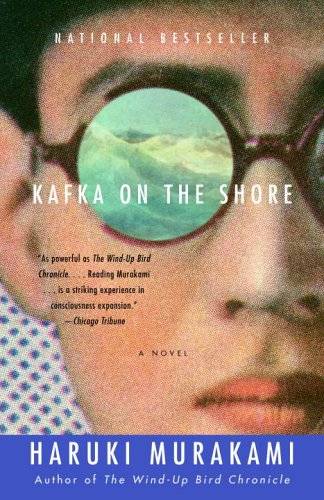Everyone should read at least one story by Murakami in his/her life. Trust me, you will appreciate your life so much better. Kafka on the Shore, while departing from many of Murakami’s usual images and themes, is just one in several that I’d recommend. With a blend of magical realism with pure fantastical-philosophical wonder, Kafka on the Shore compels you to turn each page with anticipation and excitement. Plus, if you’ve ever wondered about Japanese culture and literature, then Murakami is definitely the name to pick up. It is instantly understandable why he’s perhaps one of the most well-known international authors of today and why he was one of the top-five names in speculation of the 2010 Nobel Prize in Literature.
Interweaving several stories into one, Kafka on the Shore ambitiously sets out to capture human nature’s constant search for meaning and purpose in a world that obscures the very boundaries between what is real and what is not. Combining both Western and Eastern imagery and philosophy, Murakami expands upon how the two can be reconciled without compromising the integrity of either in possibly one of the most beautifully written novels of the past decade. Touching upon themes of sexuality, confusion of identity, Oedipus complexes, and intelligence (among many other things), Kafka on the Shore continually asks questions in bundled riddles that, while not always exciting for American—or Western—readers who want a story—and its answers—handed to them on a platter, does make for an interesting read nonetheless.
A website, in fact, was set up in 2005 to answer questions about the meaning of the book, in which Murakami personally wrote, “Kafka on the Shore contains several riddles, but there aren’t any solutions provided. Instead, several of these riddles combine, and through their interaction the possibility of a solution takes shape. And the form this solution takes will be different for each reader. To put it another way, the riddles function as part of the solution. It’s hard to explain, but that’s the kind of novel I set out to write.” It is definitely worth reading multiple times, but even for those who read it once will gain something from the experience—for it is surely a different experience to read anything by Murakami.
Telling the narratives of two seemingly unrelated characters, Kafka Tamura and Satoru Nakata, Kafka on the Shore builds a story of intrigue and mystery around both characters’ attempts to find answers. Tamura is haunted by an oedipal curse, while Nakata lost most of his mental faculties in a freak, childhood accident that eventually the Japanese army investigated back in WWII. Tamura is in constant escape-mode, as he flees his father to go work in a quiet library in Takamatsu, a small town in Japan. Smart, athletic, and, seemingly, virtuous, he must delve into his consciousness to find the afflictions of his identity, which is never defined or singular, but always amorphous and shapeless. Nakata, on the other hand, somehow inexplicably keeps getting caught up in random adventures that take him to the boundary of the unreal before interweaving paths with Tamura. And while it perhaps will never be sufficient to merely summarize Murakami’s books, it should be stated that he uses imaginary and real symbolism to elicit a strong reaction from the reader with every new and interesting detail.
Like James Joyce’s Ulysses and Virginia Woolf’s Mrs. Dalloway, Kafka on the Shore was perhaps intended not to be fully understood, with constant questions arising even after answers are provided. But that’s the, dare I say it, magic of it. Murakami reminds us that there still is a little bit of mystery in a world that believes everything has been explained. At times it can become frustrating and exhausting to constantly think about what’s going on, engaging, just as much as Murakami did in writing the book, with the characters and the themes, it is rewarding when you reach the end—no matter how many times you do read it. So, while you shouldn’t expect the book to be some fluffy novel with no substance, it should be enjoyed for what it is, stimulating, imaginative, and thought-and-page-provoking.
Kafka on the Shore by Haruki Murakami,




